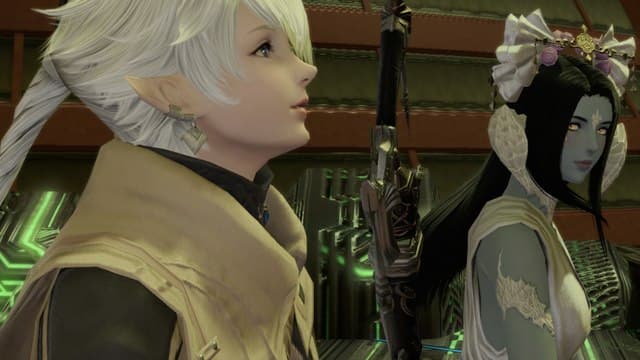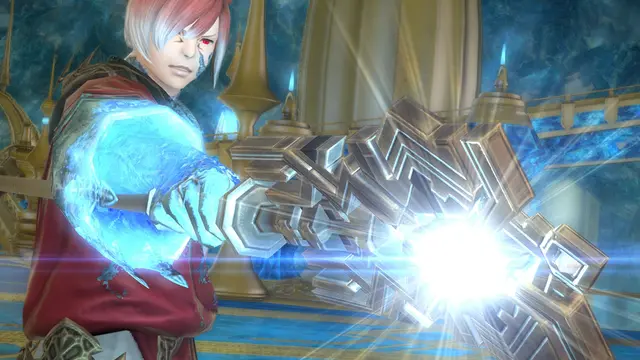When it was first revealed that Creative Business Unit III (of Square Enix) was taking on development of Final Fantasy XVI, the Final Fantasy XIV sickos (like me) were ecstatic. It’s genuinely promising to see the FFXIV team lead the next major entry in the franchise given their track record, Naoki Yoshida’s reputation, and the way FFXIV upheld the Final Fantasy brand in recent years. But there were also questions about how Yoshida would balance the personnel and resources of a development team responsible for the hottest MMORPG on the block, and now the next major installment of a series with wild expectations.
From the jump, we knew that Yoshida would only be the lead producer on FFXVI while having the role of director go to Hiroshi Takai (who also played a big part in FFXIV). We recently got confirmation that FFXIV composer Masayoshi Soken would also compose FFXVI, and that the familiar localization direction of Michael-Christopher Koji Fox was employed as well. And among the number of other developers brought on, Ryota Suzuki — known for designing Devil May Cry V’s combat and other Capcom hits — joined to be combat designer on FFXVI. But those are just a few of the roles necessary to make a whole game come to life.
Yoshida recently made his rounds in a media tour for FFXVI, speaking about several aspects of the upcoming game with various outlets. However, PlayStation Blog touched on the formation of FFXVI’s dev team, specifically. Justin Massongill of PlayStation asked about how the FFXVI dev team was built and able to make an entirely new game all while going full-speed with FFXIV.
Yoshida revealed that he initially had reservations about taking on the next Final Fantasy, but said he felt “truly honored that the company would choose my section,” referring to CB3. Ultimately, as the director and producer of the critically acclaimed MMO, he stated, “I was worried that if I took on the directorship of FFXVI, too, fans of both games would have good reason to believe I wasn’t giving either project my full attention.”
Things seemed to build gradually over time rather than overnight, though. Yoshida told PlayStation Blog, “To ensure that the development of FFXVI didn’t affect that of FFXIV, we picked out a very small group of core team members to start with, and over the course of several years, slowly and carefully transitioned them across to start work on the new game, until we had the full team assembled.”

He further explained that the process for creating the team helped ease the pressure. Yoshida said, “I’d worked with Hiroshi Takai for many years, and he’s one of my most trusted colleagues, as well as a veteran developer.” He then asked Takai to take on directorial duties and pointed out, “That’s how it all started.” From there, they brought on a few additional members, and he said, “We sketched out the core concepts of the game and its world, as well as the key themes that we wanted to put across, and started work on writing the main storyline.”
With those things in place in the early stages, he stated that they continued adding more team members to conceptualize combat, battle mechanics, graphics. Yoshida concluded, “Through a process of building on what worked and scrapping what didn’t, we gradually moved towards full-scale development. And all the while, in the back of my mind I was thinking ‘Please don’t let this impact on Final Fantasy XIV!’”
Any FFXIV player knows that the game’s development abides by a steady and predictable timeline. One expansion every two years, five major patches in between to bridge the story, additional features along the way, and interstitial content updates. Yoshida and the FFXIV team have been quite transparent about their process, even updating players that they were moving to a four-month patch cycle for FFXIV given the workload and change in conditions for them. All that is possible through adhering to schedules in a matured production process.
“I wouldn’t call it a system per se, but the project managers and assistant producers on both projects do a great job planning out my schedule to make sure I’m not overwhelmed.” Yoshida continued telling PlayStation Blog. He also mentioned that he tends to leave larger management decisions to those above him at Square Enix, letting him focus on being a producer and director for two major Final Fantasy games.

But it also sounds like the rapport of the FFXIV team, or CB3, is a contributing factor in making both FFXIV and FFXVI possible. He mentioned Soken and his team in the sound department running a tight ship as an example, and stated “Rather than a specific system or a process, it’s a sense of teamwork that we’ve built up over the years.”
“Being the director of a Final Fantasy game is a tougher job than most people imagine,” Yoshida admitted to PlayStation Blog. And he concluded, “Not only do you have the expectations of the fans and the media to live up to, but you’re constantly under pressure from the development team, too. You always have to be up for the challenge.”
FFXIV continues to reach new heights, raising the bar with each update and expansion. And as any FFXIV player would tell you, the MMORPG has only gotten better and better through the years. So, it’s evident that the development FFXVI has not come at the cost of FFXIV’s quality — it reached a peak with Shadowbringers in 2019 and Patch 5.3 in 2020, then hit a new peak with Endwalker in 2021 after all. And through most of it, did so while transitioning to new work conditions amid a global pandemic.
It’s tough to speak on the working conditions of the studio without firsthand knowledge. But as we’ve seen time and again throughout the industry, crunch unfortunately happens regularly with overly ambitious projects on unrealistic schedules and deadlines. Yoshida has mentioned several times in the past that he’s conscious of mitigating overwork within his team and has systems in place to limit crunch. Let’s hope that has helped, and continues to help, throughout the development of these games.


